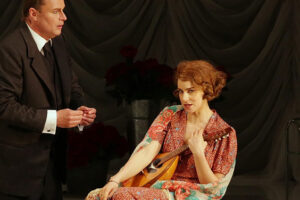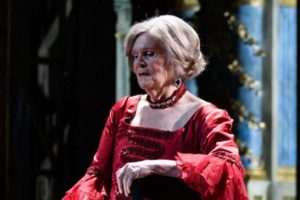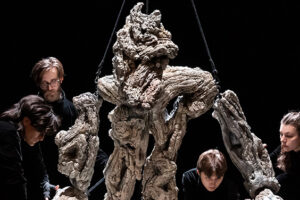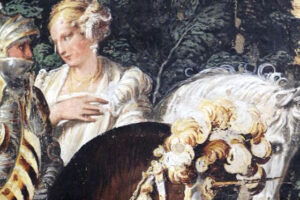

A few years ago, a friend lent me a DVD of Georg Solti and August Everding’s film adaptation of Humperdinck’s Hänsel und Gretel. If Gertrud is not the opera’s most technically taxing part, it nonetheless served as an excellent vehicle for exercising Dernesch’s instrument’s broad chromatic palette and her dramatic acumen.
In her brief scene in the first act, the vocal artistry and dramatic honesty she deployed in expressing the mother’s anger and anguish reminded me of her nuanced and deeply internalized assumptions of the great Wagnerian heroines. She made me remember why I loved Tristan and the Ring, and how dearly I valued a singer like herself who mined the text for depth to conjure a most engrossing portrayal.
The Austrian soprano celebrated her 80th birthday yesterday, marking ten years since she retired from a stage career that spanned nearly five decades. The trajectory of Dernesch’s vocal development is rather unusual, with the bookends populated by mezzo soprano roles like Marina (Boris Godunov), Fricka, and Klytämnestra, and the center illuminated briefly by memorable interpretations of the great heroic characters.
Although a vocal crisis curtailed the time she spent in the hochdramatischer stratosphere, she invested her recorded portrayals of those heroines with such warmth, vulnerability, and passion that I ultimately find them irresistible despite her shortcomings.
After restructuring her voice as a mezzo soprano, her career found a distinguished second life in character roles that exploited her gifts as a superb painter of words. This character phase would enable her to continue inhabiting some of the operatic canon’s most theatrically intriguing characters until 2009, when she bade farewell to the stage after playing the Grandmother Buryjovka in Jenufa at the Bayerische Staatsoper.
Dernesch’s auburn instrument has always struck me as one of the most beautiful female voices in opera. In recordings that date from her earliest years (1960s), one can hear a luxurious, evenly produced soprano that rings clearly at the top, the emission devoid of the strain characteristic of her work in the mid-1970s.
Her vocalism in these Mozart and Verdi arias is impressive, especially when one considers that she was only in her early 20s when these recordings were minted.
Lustrous in tone and capable of delivering cleaving power, her soprano eventually caught the attention of the supreme aesthete Herbert von Karajan, who subsequently cast her as the dramatic soprano lead in his Salzburg stagings of Tristan, Fidelio and the Ring.
The studio recordings of those productions, easily the most recognizable items in her discography, feature the hallmarks of her interpretive abilities and dramatic vocalism. Her Fidelio with Jon Vickers is one that I find incredibly vulnerable and moving, and the latter two Brünnhilde’s are ones that I cherish for her bringing a deeply human facet to this most complex of characters.
However, a more careful listen of these studio recordings and their live analogues also reveals some of the technical flaws that would later derail her progression as a bonafide dramatic soprano. When tasked to produce an arching Wagnerian legato, Dernesch’s tone and support could at times waver under pressure.
While the voice was solidly produced and generous throughout its middle, it didn’t always welcome the topmost notes freely. That a singer of such bountiful promise would encounter such issues is not surprising when one realizes that Karajan booked her consistently for the heavy dramatic roles beginning in her late-twenties.
Eventually, the strain of undertaking such powerful roles at her young age took its toll on her instrument. Her top calcified and became recalcitrant, and her production lost the homogeneity and the ease that initially marked her as the post-Nilsson generation’s next great dramatic soprano.
In 1976, while rehearsing the Dyer’s Wife with Christoph von Dohnanyi, he suggested she might retrain as a mezzo due to her increasing vocal troubles. She wisely took his advice and extended her career’s lease for another 33 years.
While I regret that Dernesch’s successes in the hochdramatischer fach were largely confined to her collaborations with Karajan, I wouldn’t trade an alternative possibility for the tremendous things she accomplished during her character phase. An intelligent and musical artist, Dernesch flourished in the more colorful characters of Wagner, Strauss, Othmar Schoeck, and Kurt Weill.
If she was a beautiful and deeply human Brünnhilde, she commanded one’s attention even more as Fricka and Waltraute. The natural weight of her soprano may have impeded her success as Salome and Elektra, but as Herodias and Klytämnestra few others brought such glamor and sexual magnetism to these brief yet pivotal mezzo characters.
She also created a few operatic roles. From the late 1970’s onward, she served as something of a muse to the German composer Aribert Reimann. Her most memorable character for him was her diabolical Goneril in the masterpiece that is Lear. In later decades, she would create the role of Hekabe in Reimann’s Troades, as well as the eponymous character in his operatic adaptation of Federico Garcia Lorca’s La Casa de Bernarda Alba.
Helga Dernesch may not have been a technically pristine vocalist, but I often find her artistry on developing a character very compelling. After seeing her powerful portrayal of Gertrud on the Solti DVD, I immediately searched my collection for her Isolde with Karajan.
Listening to this recording again after all those years was like visiting an old friend. Present there was Vickers’ manic Tristan, and the Berlin Philharmonic playing Karajan’s erotic vision of the score. Also there was Dernesch’s Isolde, a complex vocal portrayal forged from the fire and ice of the soprano’s peculiar timbre.
This was a reading that, for all its imperfections, seduced me to the musical landscape of Wagner’s music dramas nearly 15 years ago. While there may be other recordings of Tristan that better this in one or two aspects of conducting or vocalism, no other studio effort on balance capture the erotic and the sublime better than the partnership between Karajan and his principal singers.
Capping it all is a glorious Liebestod, Isolde’s phrases colored with abandon and rapture by Helga Dernesch.
Happy 80th birthday Helga! Thank you for your artistry and commitment, and for playing such an important role in developing my ears as a Wagnerian and an opera lover.
























Comments